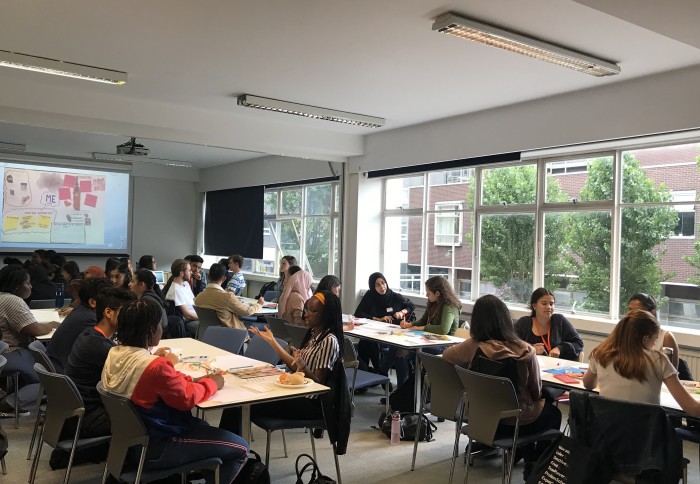Developing the doctors of tomorrow with MEdIC

Leaders from Imperial's Medical Education Innovation and Research Centre took time out to discuss their evidence based approach to medical education.
MEdIC was launched by Imperial’s Undergraduate Primary Care Education Team as a first of its kind translational centre in 2019. Its Director is Dr Sonia Kumar, who sees the centre's value in tackling the challenges of caring for an ageing, increasingly diverse population facing widening societal inequity.

“We have a responsibility to develop doctors who understand the changing societal and healthcare landscape, so they can offer impactful, compassionate care. MEdIC represents a radical rethink around learning and how to support students to become good doctors. We take an evidence-based approach to addressing NHS needs, and the challenges posed by the communities it serves.”
The centre applies its innovative approach to medical education across five core areas: diversity and inclusion, promoting person-centred coaching, longitudinal learning, professional identity and practice and digital health and education.
To achieve progress across such wide-ranging issues, MEdIC brings together a diverse team. Alongside NHS clinical academics like Sonia, it employs a Community Lead, who is embedded at local levels, as well as experienced educationists and educational researchers. MEdIC is also working with numerous national and international collaborators. Dr Jo Horsburgh, MEdIC's Lead for Medical Education Research, believes this unique collection of expertise helps achieve real life change.

"The MEdIC mission can be seen as a triangle, with the three corners representing the evolving needs of the community, our healthcare system and its workforce, and our students. In the centre of this triangle is where our research and innovation deliver societal impact."
To find out more about MEdIC’s work, Jo and Sonia introduce us to colleagues behind three projects that highlight the Centre's new approach to education and developing the health workforce of tomorrow.
Student Covid volunteering
In response to the Covid-19 pandemic, MEdIC provided opportunities for 70 medical students to volunteer in 45 GP Practices across the UK. The aim was to show a different side to primary care whilst giving the students meaningful roles during this time of national emergency. These included running supervised telephone clinics for vulnerable patients living in isolation, before debriefing to the practise management on their needs and how to meet them.

“For the students it was an education in how to be a doctor,” says Dr Ravi Parekh, Clinical Lead for MEdIC.
“We wanted them to learn the art of medicine and get a sense of the pride you feel from making a real difference to people’s lives. The fact they could do this while supporting a GP Practice team tackling the Covid-19 pandemic within their local communities made it a great project.”
The MEdIC team are now evaluating the project to gauge how to incorporate this type of service-learning throughout all primary care courses.
Empowering learners through coaching

In March a new MOOC (Massive Open Online Course) on Coaching Skills for Learner-Centred Conversations was launched. Drawing on coaching theory within education, psychology and sports, it was developed by Dr Arti Maini, in conjunction with EdX and Imperial’s Digital Learning Hub. The MOOC utilises various learning activities, from interactive videos and quizzes to global discussion forums.

“I hope students working with educators who have participated in this course feel empowered to take ownership of their learning,” says Dr Maini. “By tapping into their resourcefulness, inner strength and capabilities, they can set and achieve learning goals, identify solutions to the challenges they experience, and maximise their potential.”
The online course builds on the success of MEdIC’s face to face training courses in coaching, which were initially rolled out across Imperial's Faculty of Medicine teaching community prior to global delivery. Internationally the MOOC in Coaching for Learner Centred Conversations has seen 6583 enrolments to date spanning 137 countries.
Dr Maini also leads MEdIC’s work on person-centred health coaching, and has trained medical students, clinical faculty and frontline community health teams, including the Grenfell Outreach Team. A new MOOC on Health Coaching Conversations will be launched on the global Coursera platform in September 2020 to enable wider access to this training
WATCCH Imperial student mentors

Currently 80% of medical students come from just 20% of UK schools, calling into question the future workforce’s ability to serve a diverse population with increasing social inequality. Launched in 2017, WATCCH aims to raise aspirations of year 12 students from disadvantaged backgrounds around healthcare careers.
Campus inductions introduce participants to doctors, nurses, midwives, physiotherapists and other professionals. They can then go on work experience placements, attend university application workshops, and receive mentoring from specially trained Imperial students.
100 students having completed the programme, which is supported by Health Education England. 60 more places have been offered in 2020/2021.

“Medical schools are critical in developing a healthcare workforce that reflects and understands the communities they serve," says Medicine in the Community GP Course Lead, Dr Nina Dutta.
“There are so many talented, hard-working young people in our local community who, if given the chance and expert support MEdIC can offer, would make caring and intelligent healthcare professionals.”
For more details on the work of MEdIC, please visit their website.
Article text (excluding photos or graphics) © Imperial College London.
Photos and graphics subject to third party copyright used with permission or © Imperial College London.
Reporter
James Romero
Office of the Provost
Murray MacKay
Communications Division